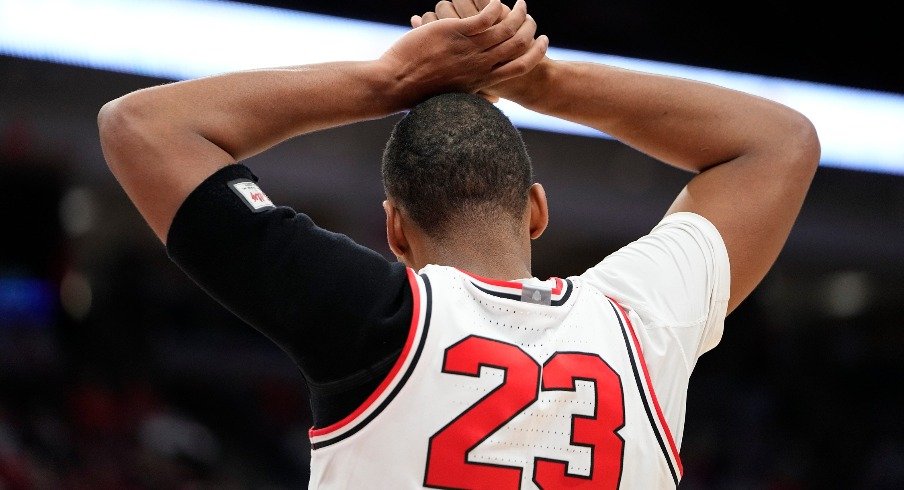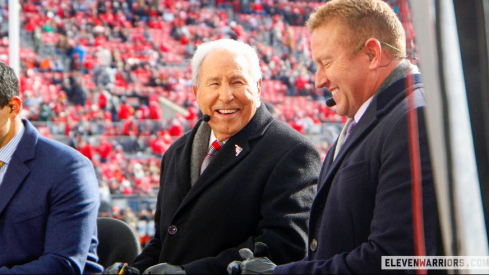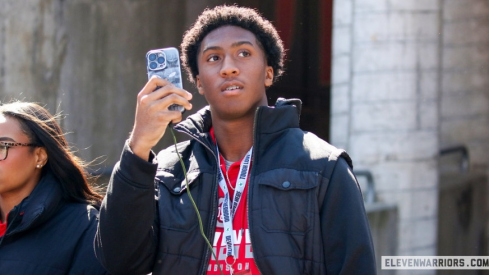The pain scale couldn’t get much higher for Zed Key.
Once his shoulder dislocated against Purdue on Jan. 5, Key clutched his arm, closed his eyes and grimaced. The Buckeye big man tried to move his arm, but “it just wasn’t happening.” When Key mustered up the courage to glance at his injured shoulder, he didn’t like what he saw.
“That don’t look right,” Key thought in the moment.
Just four minutes in, Key was done for the night. He soldiered on to appear in 11 more games for the Buckeyes, shoulder brace and all, but Ohio State’s starting center was a shell of himself. Key was one of the Buckeyes’ most consistent performers through the first 13 games of the season, averaging 13.4 points on 63.5% shooting and leading Ohio State with 8.4 boards a night. After the dislocation, Key’s numbers shrank to 8.4 points, 44.7% from the floor and 7.2 rebounds.
Those stats dwindled even further in what would end up being his final four appearances, a stretch in which he averaged just 5.5 points per game before the incident that effectively ended his season. In the second half of a blowout loss to Iowa on Feb. 16, Key went down to the floor, grabbing his injured shoulder once again.
Only this time, he never returned to the floor.
“After I got hurt, the Purdue game, I've been kind of like monitoring it. Wearing the brace and tape underneath the brace, just to keep it stabilized,” Key said in an interview session last week. “But just keep getting hit in it every game. It's not like the teams are going for my shoulder. It's just basketball plays that they're trying to make. But in the Iowa game, when I tried to play defense, and he was going baseline, I just put my arm out, and it did what it did. I thought, 'OK, my shoulder's not getting any better.' So I was like yeah, I might as well get it now and get everything right, get the surgery done and get my shoulder back to 100 percent.”
Even with Ohio State all but eliminated from NCAA Tournament contention, Key didn’t take the decision to end his season lightly. It took multiple calls with his family before he finally concluded that enough was enough.
“It was tough. Obviously, I've been battling through it, and that was another thing. I was like, 'I can keep pushing through it.' But just where it was after the Iowa game, there was no reason to keep going,” Key said. “It was definitely a tough decision. I had to think about it for a couple of days. I didn't make a decision right away. But I did some long, hard thinking and decided to shut it down.”
The injury clearly limited Key before the Iowa game, but to what extent was difficult to discern. Key downplayed how much the shoulder bothered him during in-season interviews as he tried to tough out the issue as best he could. Not to mention, Key tended to fade in the second half of previous seasons, even without injury.
"This will be a critical offseason for him. It'll be somewhat limited, but it's still going to be a very critical offseason.”– Chris Holtmann on Zed Key
Now that his season is over, though, there’s no reason to hold back. When asked how much his statistical drop-off had to do with his shoulder, Key earnestly responded, “a lot.”
“Obviously, I'm down in the post, so I use my shoulder a lot to get the defender off my body. I do a lot of jumping, grabbing rebounds, and people going in there and hitting your arms,” Key said. “And I use my left hand a lot for the jump hook. So even with the brace on, it definitely affected me a lot because I knew that my shoulder wasn't 100 percent. And the shots that were falling at the beginning of the year that I knew I could make just weren't falling. So it goes back to that frustration standpoint too because you know you can do something, but you know you're not 100 percent.”
After undergoing surgery to repair his labrum last Thursday, Key’s first priority will be working his way back to full health. But Chris Holtmann said he’d also need to make significant improvements on the court ahead of his senior season at Ohio State, even if he won’t have a full summer to do so.
Key faces his most important offseason to date for all those reasons.
“He's had moments later in the season where his production has dropped off, and some of that's been his conditioning. So my challenge for him was to finish this well. I do think the injury was real. It really did limit his conditioning, his fitness, his ability to practice hard,” Holtmann said. “And then he just couldn't be the same player with how physical he is. But I do think he was on a good trajectory before the injury. I think he had good moments. But there's still a lot for Zed to grow, and he has to get better in a lot of areas. And he knows that.”
Doctors gave Key a potential four- to six-month timeframe to recover, but he said he doesn’t plan to push those limits and potentially risk re-injury. On the bright side, the decision to shut Key down before the season means he can return to action sooner than originally intended. Before the Iowa game, the plan was to manage the injury until the end of the year, at which point the medical staff would evaluate whether or not he’d require surgery. But any delay has been taken out of the equation.
The road to recovery will be just as difficult, but now Key will have a bit more time to work on his craft before the start of next year. And whenever he gets healthy, Holtmann is confident Key can make up ground to take the strides he deems necessary.
“I think he can (make the improvements). I really do think he can. But I think there's a lot of room for him to continue to grow,” Holtmann said. “He had a really good first part of his junior year. And I think we could have built upon that. I would have been interested to see if this would have been a year – typically you see that with young players where they can later in their freshman or even sophomore year, they can struggle a little bit, and then as they get older, they really finish better. And I was hoping that was going to be the case for him, but the injury got in the way.
"So, listen, I think he had some really good moments this year and some really good growth opportunities. But this will be a critical offseason for him. It'll be somewhat limited, but it's still going to be a very critical offseason.”
As for what Key deems to be his biggest areas for improvement, the 6-foot-8 center wants to refine his skills on the perimeter to become a more versatile player. Key shot 42.9% on 14 attempts from 3-point range through the first 10 games of the season but went just 1-for-10 the rest of the season after that. Next season, Key wants to be even more active from beyond the arc.
“Obviously, continue expanding my game. Just shoot more threes,” Key said. “I don't know how many I made this year or how many I shot. But just keep expanding from that. Faster footwork, better conditioning, the same things I said last year. Just keep improving on it and just keep growing my game. (Being) versatile, keep expanding it to the perimeter.”
Holtmann began discussing plans to play both Key and freshman center Felix Okpara together on the court in 2023-24 back in the preseason, and Okpara has only gained more experience since Key was shut down. This offseason, that plan figures to be put in motion, although it may hinge on Key’s ability to expand his game.
Peep @JusticeSueing's perfect alley @OhioStateHoops' @Felixokpara24 knew what to do with it. pic.twitter.com/0eqgNztcCq
— Big Ten Network (@BigTenNetwork) March 4, 2023
Either way, Key believes the pair could be lethal next season.
“We would be a problem. Because he'd be down there, he's 7-foot, athletic, times, just blocks well,” Key said. “But even if I'm playing the four, I could go down to the post, and it would be a mismatch problem. So it would definitely be tough for other teams to guard.”
Until then, Key has a mountain to climb, and he said he “absolutely” has a chip on his shoulder to reach the peak.
“I'm ready to get back, ready to be 100 percent and working out,” Key said. But this is my path right now and I'm just gonna take it and continue to get better every day.”


